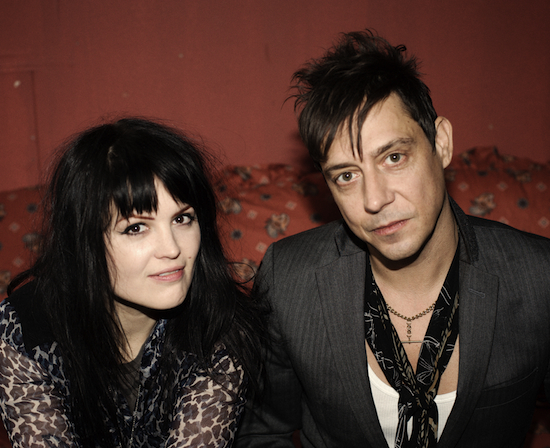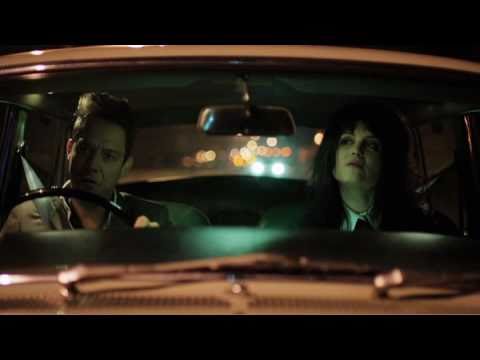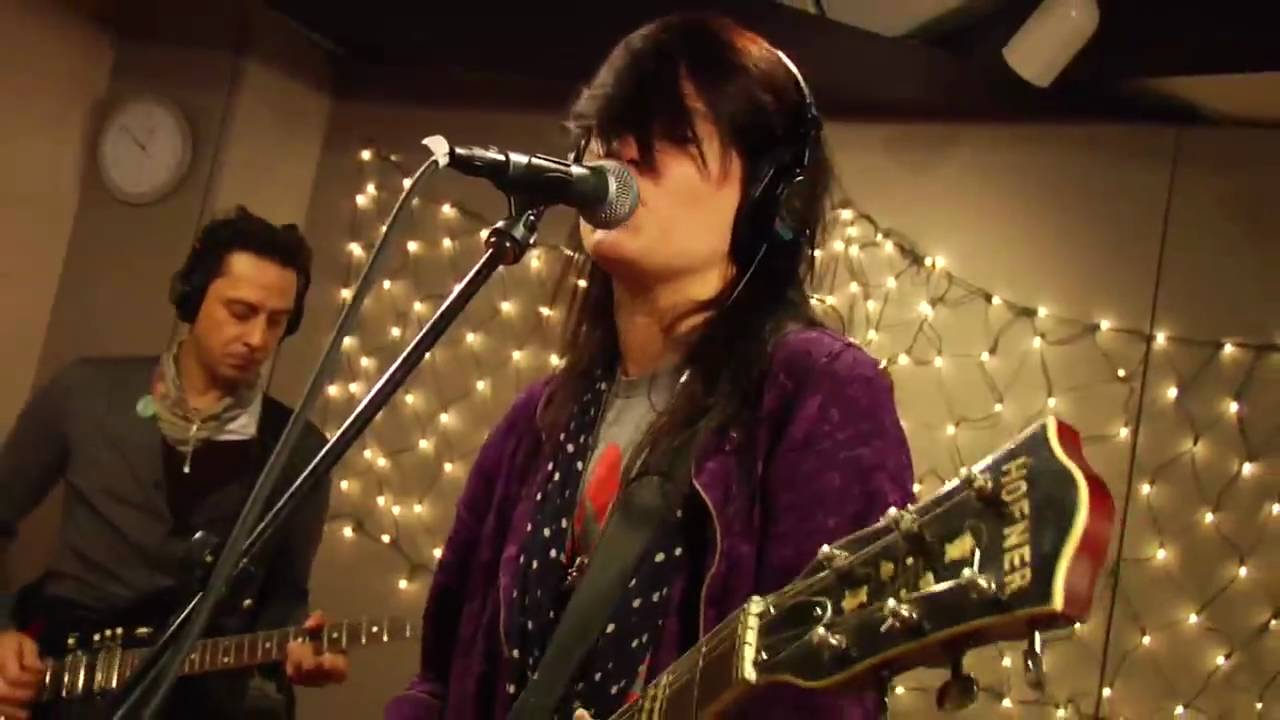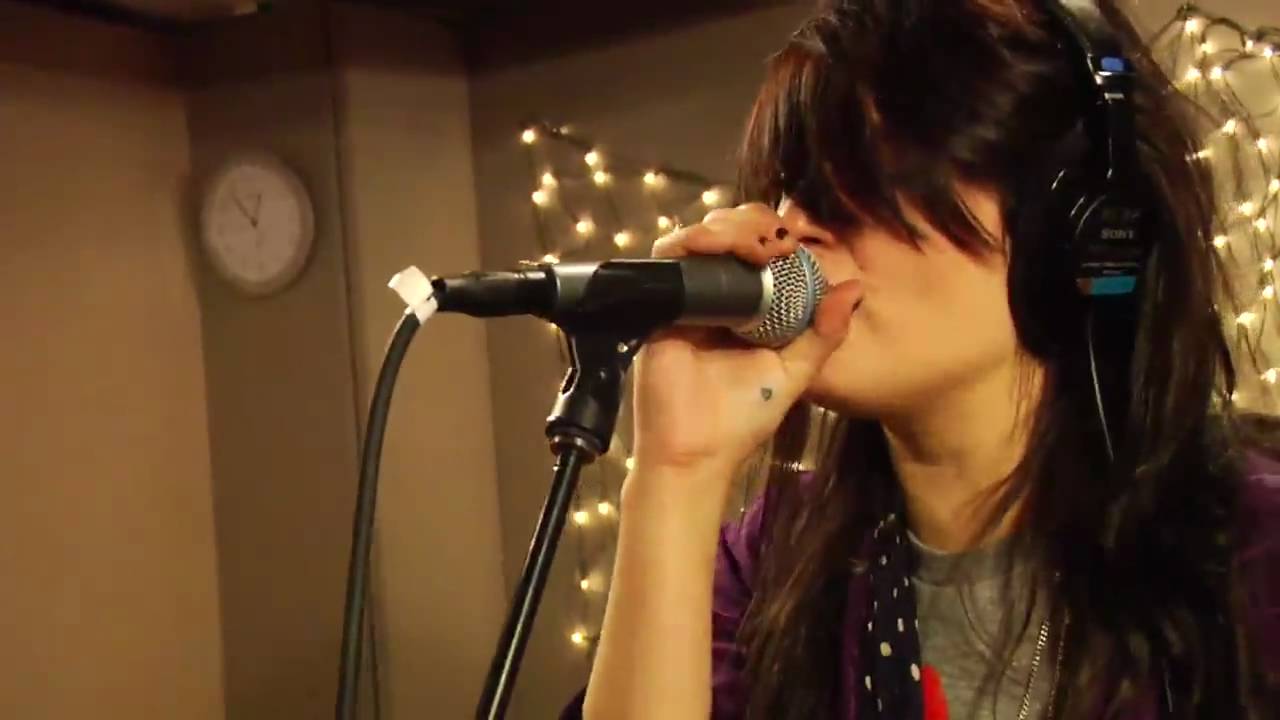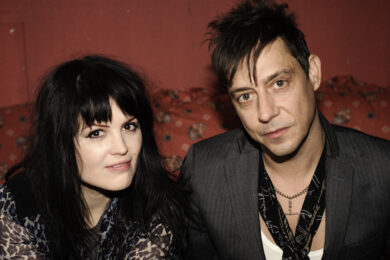Judging by all the skinny blokes with bad David Bowie haircuts and androgynous torso coverings, desperately trying to look unimpressed at The Kills’ recent Roundhouse show – both onstage in the opening acts and in the incredibly fashionable audience – one would assume that the Anglo-American duo would be the epitome of indie rock pretentiousness. Actually, watching their performance reveals that nothing could be further from the truth; guitarist Jamie Hince and vocalist Alison Mosshart weave in and out of one another in both sound and space, creating intense musical and, yes, sexual tension. Their studio recordings are given new life with the increased breathing room of the stage, which looks massive with only two darkly-clad figures on it.
Hince, especially, is impressive in the live arena. Without the wild gesticulations or attention-grabbing vocal acrobatics of his American bandmate to help him get noticed, he’s still up there dominating his corner of the stage with jagged garage rock riffs and knowing nods to an adoring audience. Unfortunately (or perhaps fortunately, depending on one’s view of the limelight) his life has increasingly been overshadowed by those around him. Alison Mosshart, his supermodel fiancée Kate Moss, and even the only tangentially related rock persona of Jack White have lately begun to make Jamie Hince appear to be the least important part of Jamie Hince’s life – or so it would seem from an unstudied reading of the past year or so of Kills press. This is patently unfair. Hince is a fascinating individual whose role in The Kills is equally crucial to that of Mosshart’s, and one lacking any of the pretension that his status might imply.
In light of all this, we gave Hince his day in court, inviting him to chat about the differences between writing fiction and writing rock lyrics, The Kills’ recent North American tour, the constant comparisons to Jack White and his bands, and, most importantly, how excellent he thinks The Quietus is.
How was the North American tour?
Jamie Hince: Really good, yeah. A lot of work, but we just kept going on about how surprised we were by the response. It felt really like a wave of something was happening. Everything sold out and it felt really good. We’re always still humbled by that, I think. When I think about when we first started out playing to handful of people, it’s just pretty humbling.
We’ve been looking at the gig posters and they’re quite nice. Why did you decide to do a unique print for each date?
JH: It was something Alison came up with. I thought it was quite a big deal to do one for each city, but she was quite determined for it to be like that, and it worked out so good for us. Everything’s such a marketing ploy these days, I think, so it’s nice to do something special for a particular city, and kids are showing up. It’s a poster for their city, and specifically chosen for it, too. It’s not like we were sent a bunch of posters and said ‘Yeah, fine.’ We actually quite painstakingly went through quite a few ideas to get the ones we wanted.
You just talked earlier about how it’s been different playing to a lot of people now, whereas when you first started you weren’t playing to many. How has the musical landscape changed since those early days?
JH: It’s changed beyond all recognition. When we started writing songs for The Kills, there was no MySpace or anything. When we first started we really wanted it to be this word of mouth thing. After we did five shows, record labels wanted to sign us, and we went straight to America. We always found a way, really. We had this idea that we wanted people to have to catch up with us and it was quite important for us to be word of mouth, but that’s just impossible now. New bands starting out get to see everything, warts and all, with the click of the button.
Halloween before last, you probably remember contributing a short horror story for The Quietus. Do you write fiction regularly?
JH: Irregularly. Quite a lot, but I go through months where I don’t write anything and then I’ll write nonstop for awhile. It really annoys me because I’d like to spend more time, but I’m not very good at doing things simultaneously. I always throw everything into one project. So when I’m with The Kills, that’s all I think about, really. I studied playwriting at university. That’s what I did my degree in. I always wanted to be a playwright. I kind of still get to do that, in a way.
Who are some of your literary influences?
JH: Günter Grass, Dostoevsky… I like the kind of prose by writers that are doing something politically with their work.
Do you feel that there’s a similarly lo-fi quality to your prose that there is to your music?
JH: I don’t know, really. You can’t really judge your own work, can you? I like reading translations. I like when you read a Tolstoy translation and the English is weird and you can tell it’s been translated. I find that to be kind of my style when I write. It’s sounds like a translation. And I love Steven Berkoff’s stuff. He’s this amazing playwright and he’s sort of made up his own Shakespearian language made out of Cockney mining slang. It’s really quite something.
Alison writes more of the lyrics for The Kills. Do you share similar visions as wordsmiths?
JH: Yeah, I mean, she writes a lot more than me. She’s really prolific with writing. It all just comes out of her. It tortures me. I don’t find it easy at all. And the problem with trying to write for rock & roll meter when you write words is it’s just so limiting. You can’t write like when you’re writing yourself with your head in the clouds and it all comes out and you’re just writing to write and you read it back and have no idea where it came from. With lyrics you have to be concerned that the timing is right and the inflection and all that. Alison can do that. But on the new record, it’s pretty half and half. There were six by me and five by her. More than anything, we just sort of want The Kills to be of one heart.
Do lyrics come easier for you now than they used to?
JH: Nope. It’s a lot more difficult. I think that happens as you get older. You lose that naïveté about ‘I’m gonna grow my hair to scare the teacher away’ or whatever that old Mott the Hoople lyric is. When you’re a teenager it’s really important to be naïve like in ‘Suicide Sally & Johnny Guitar’, but as you become older it becomes a lot harder. And I always want to write about things that are personal to me, things that make me vulnerable because it’s always so exciting when you can pull that off. But now I don’t really want to share my personal life, so it’s even more tortuous. It’s just this constant paradox.
Let’s talk about Blood Pressures for a second. Most of the reviews seem to frame the album in terms of Jack White, either by saying that The Kills are filling the void that The White Stripes are going to leave, or by saying that Alison honed her voice in the Dead Weather. Do those comparisons bother you?
JH: They don’t bother me. I don’t really search those kinds of things out. I’m just absolutely concentrated on The Kills and I don’t really care what people think or say about it, even our fans. I think you’re in trouble if you start only doing what your fans expect of you. So when people write about our success in relation to Jack White or The White Stripes, it doesn’t torture me too much. I think it’s hard to expect journalists to pin down your sound, anyway. Especially since the heyday of rock journalism, it’s just easiest to describe bands by comparing them to other bands.
Do you think that’s lazy writing?
JH: No, I don’t think it’s lazy. I’m sure they work hard and stay up late and all that sort of thing to try and make a deadline, but that’s what it is, ultimately. Meeting a deadline. You’ve got to write something that’s going to meet the needs of the magazine. I’m absolutely not slagging off on rock journalism, it just doesn’t interest me as a musician what people write about me. So when people try to wind me up by writing that we’re influenced by The White Stripes, yeah, there’s a real truth to that. The White Stripes opened up the door for a lot of bands.
I think it’s weird that people think they’re winding me up by writing that we’re filling The White Stripes’ void. They were fantastic. Jack White did wonders for our band, and he did wonders for Alison with The Dead Weather. One thing that was a challenge practically, though, was after she came off tour with them she was singing with this really powerful rock voice that she’d ‘honed,’ as they say, in The Dead Weather. The vulnerable side of her voice is what I love about The Kills, the way it kind of cracks, and when she just belts it out there’s kind of only one dimension. I speak to Alison so much, as you can imagine. I’ve called her and talked to her and screamed at her so much. We’ve cried, we’ve laughed, and I know every tiny aspect of her voice, and all of those aspects I want to hear in my band.
It looks like we’re about out of time, but thanks for talking with us, Jamie.
JH: Thank you very much. I love your website, by the way. I find it very inspiring.

